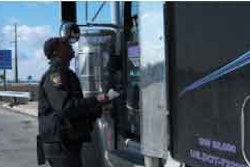Partners for the long haul

Volatile fuel prices, rising equipment costs, driver shortages and hours-of-service regulations are some of the many constraints on truck capacity now and in the future. More transportation companies are solving these capacity challenges by rail – at least for their long-distance shipments.
Swift Transportation began using rail in the early 1990s to reposition its trailers across the country as freight volumes surged. This practice evolved as customers began asking Swift to be a one-stop shop for truckload and intermodal services.
Today, current and prospective customers ask Swift to provide rates for over-the-road trucking as well as for three types of intermodal services: trailer on flat car (TOFC), container on flat car (COFC) and expedited COFC, says Mark Young, Swift’s vice president of intermodal.
Until about five years ago, NFI Industries passed through intermodal sections in bid packages. But in the service-sensitive business of trucking, NFI executives came to see intermodal as a growth opportunity and a complement to its environmental initiatives and driver demographics, says Ike Brown, vice president of intermodal for the Vineland, N.J.-based carrier.
Both Young and Brown shared these and other experiences at a meeting organized by railroad company BNSF last month at the annual Truckload Carriers Association convention in San Diego.
In the past two years, BNSF has invested billions on new infrastructure, equipment and technology to expand its intermodal network. The company provides time-sensitive rail intermodal service to 20 major points in the United States. Today, BNSF has 90 truckload (primarily dry van and temperature-controlled) carrier customers, a third of which have joined in the last 24 months. Not all customers move thousands of trailers and containers a year like Swift or NFI; some operate as few as 10 pieces of equipment.
Proponents say transit times and service levels are reliable.
Some carriers at the meeting were skeptical that rail intermodal could match the service levels demanded by customers. One executive asked a BNSF representative if the company would pay the penalties charged by shippers such as Wal-Mart and Proctor & Gamble for late deliveries. The BNSF spokesman answered “no,” explaining that transit times are reliable. Both Young and Brown agreed.
Intermodal ideally is suited for truckload and less-than-truckload shipments of between 600 and 800 miles, and transit times between rail ramps are comparable to that of a solo truck driver. For intermodal to be as efficient as door-to-door trucking service, carriers should limit drayage operations to a radius 200 miles from rail ramps, Young says.
Many third-party logistics companies, even those associated with carriers, also are intermodal marketing companies (IMCs) for railroads. IMCs work directly with shippers, railroads and trucking companies to source capacity for door-to-door service.
England Logistics, a wholly owned subsidiary of C.R. England, provides a full array of transportation services. “The intermodal piece is the primary target given the condition of capacity and the anticipation of further tightening,” says Jason Beardall, vice president of truckload sourcing.
On the asset side, C.R. England operates 350 refrigerated trailers equipped for rail intermodal. The company is adding another 300. In the last six months, England Logistics has experienced tremendous growth by working with customers in both its asset and nonasset divisions to convert truckload shipments to COFC shipments. England Logistics also has a group that sells COFC intermodal services to shippers as an IMC. Its IMC has the added advantage of leveraging C.R. England’s pricing agreements with railroads.
Whereas railroads, IMCs and 3PLs once were viewed by asset-based carriers as competitors, they quickly are becoming essential to the healthy survival of long-distance time-sensitive ground transportation. n
Aaron Huff is Senior Editor of Commercial Carrier Journal.
E-mail [email protected] or call (801) 754-4296.










